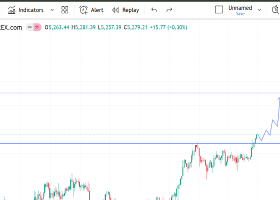The complacency that surrounds Brexit is a far cry from the stark warnings that lled the nancial pages in the wake of Britain’s historic vote in June. At that time, most economists predicted UK GDP could shrink as much as -6% and the country would be plunged into a
deep recession as protectionist barriers and capital controls would destroy all possibility of economic growth. In reality, of course, the UK saw the fastest growth of any G-7 nation in the post-Brexit vote time period as the economy continued to create jobs and generate growth far in excess of market expectations.
However, before sterling bulls start their celebratory dance we should note that the UK achieved this economic performance under the best possible conditions. In the wake of the Brexit vote cable lost more than 20% of its purchasing power dropping more than 3000 pips from its pre-Brexit high of 1.5500 to the current 1.2500 rate. The massive decline in currency exchange rates made UK goods and services far more competitive within the European Union thus providing UK businesses with the best of both worlds - competitive prices and full, unfettered access to the market.
Now that the UK is about to trigger Article 50 such a goldilocks scenario is unlikely to hold. In fact, looking at the table above we can already see that UK growth is starting to slow while in ation is creeping higher. The virtuous cycle (lower currency rates and full access to the EU market) that was so instrumental to UK growth for the past six months is now about to give way to the vicious cycle (higher in ation and more restricted access to the common market).
Much of the GBPUSD trade will depend on the state of negotiations with the EU once Article 50 is triggered. There are two camps of thought with respect to the UK exit resolution. Cable bears are convinced that the EU will want to “punish” the Brits and make an example out of them so that no other member of the union decided to secede. The “hard Brexit” scenario calls for very harsh trade terms for the UK, as well as a heavy penalty ne for the right to exit.
Most analysts, however, believe that it would serve neither party well to have a di cult divorce. The UK, after all, is not only the second largest economy within the bloc, representing massive consumer power to the rest of the continent, but is also the global hub of international nance serving as a very valuable intermediary between Asia, the Middle East, and North America. It is perhaps this aspect of Brexit that is most overlooked in market analysis. While most traders are focused on the state of trade ows - the key to the UK’s economic survival will be the state of capital ows. For all intents and purposes, the UK is a nance economy and nance is its greatest product. That’s why the survival of the UK nance sector will be the key to the survival of the UK economy as a whole.
The key question is whether London will be able to retain its hold on higher level nance tasks from investment banking to market making to money management. Several European cities including even Paris are making a bid for both nance and high tech professionals to take the plunge and make the move to the Continent and if this dispersion starts to take place then the UK economy will be irreparably weakened.
The central con ict between the UK and the EU is that Great Britain wants to have full access to the European market while restricting the movement of EU citizens within its own borders. That simply will not y with the Europeans whose system is based on the fundamental premise of free ow of goods, services, and individuals. If the UK stubbornly clings to its nativist stance without some compromise, the selling pressure on cable will likely accelerate.
If, however, the parties dig in on the freedom of movement issue the long-protracted negotiation with all of the concomitant recriminations is likely to cast a pall over the UK economy. Business investment will freeze and further pressure on the pound will create stronger in ation and dampen consumer demand.
Technically, the key levels for the cross are the 1.2600-1.2800 region to the upside and the 1.2200-1.2000 corridor to the downside. A break above the 1.2800 gure would suggest that negotiations are proceeding well and that cable is headed towards the 1.3500 target. The 1.2800 level is the major overhang resistance in the aftermath of the Brexit vote and a clearance of that barrier would signal a strong level of con dence by the market.
On the other hand, a break towards the 1.2200 gure would put the 1.2000 ash crash
level squarely in view of the shorts and would be a very negative development for the pair suggesting a precipitous decline for the UK economy and possible test of the multi-decade lows at 1.1500. Just a few years ago, the idea of near parity for cable may have seemed absurd to most currency traders but Brexit has produced up all sorts of unexpected scenarios and we
will be watching both the charts and the negotiations to determine the next big move in the currency.



